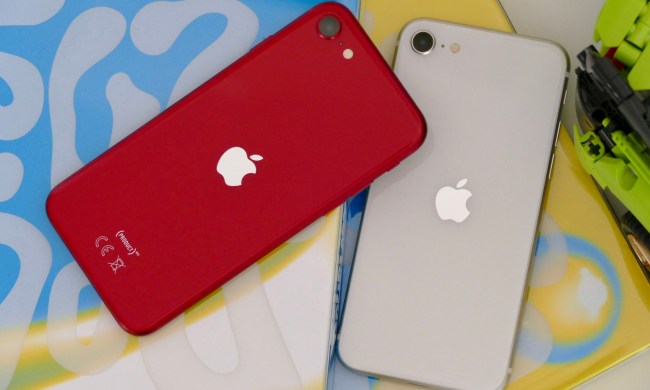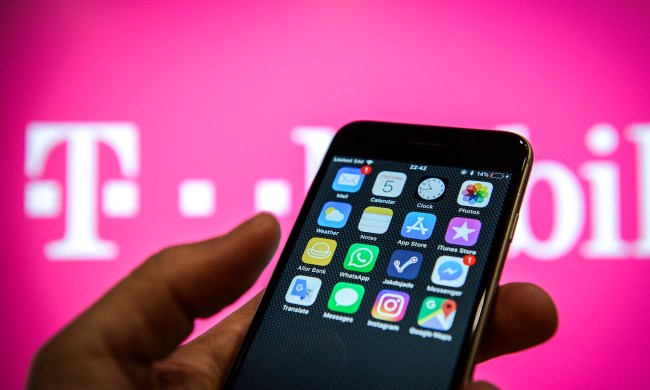
For more information check out our article on T-Mobile’s G2 press announcement.
Sometimes, what you can’t see is more intriguing that what you can. Just watch the suggestive silhouettes traipsing around the title sequence of a James Bond film. T-Mobile reached for the same silhouette tease when it released just a vague outline of the upcoming T-Mobile G2 last week. While the rectangular blob doesn’t compete with Bond girls, it certainly managed to draw some attention to the mystery phone.
As a successor to the first Android phone ever – we’re not surprised. But will the T-Mobile G2 set the pattern for a revered Android dynasty… or merely tap into a vague sense of geek nostalgia to hawk yet another vanilla Android handset?
T-Mobile hasn’t tipped its full hand just yet, but a few slips, leaks and downright speculation can help fill in the gaps. Here’s everything we know so far about the T-Mobile G2.
 It will ride on T-Mobile’s speedy HSPA+ network.
It will ride on T-Mobile’s speedy HSPA+ network.
The most solid bit of information we have to stand on for the G2 comes directly from T-Mobile, which is already hailing the G2 as the champion of its high-speed HSPA+ network. HSP-what? It’s a sort of evolved 3G network that T-Mobile has been rolling out all across the country with upgrades to existing towers. According to the carrier, HSPA+ can deliver speeds of up to 21mbps down and 5.7mbps up, rivaling early 4G networks like Sprint’s WiMax, which could make the G2 competitive with the likes of Sprint’s EVO 4G and Epic 4G – if it can deliver.
It will be a T-Mobile-branded version of the HTC Vision.
A leaked copy of the firmware for the upcoming G2 revealed all sorts of good tidbits on the upcoming device – including its real identity: the HTC Vision. While it comes as no surprise that HTC, which built the G1, is up to bat yet again for the sequel, equating the Vision with the G2 connects the dots with all sorts of other details. Leaked photos, for instance, suggest it will have a full QWERTY keyboard
It will be powered by a snappy 1GHz chip from Qualcomm.
While rumors that the G2 would run a new dual-core Qualcomm chip fizzled when we found out the G2 was the HTC Vision and not the HTC Glacier, the 1GHz Qualcomm MSM7230 that will power it instead should be no disappointment. Android and Me suggests the MSM7230 should fall in line with the Samsung Hummingbird in the Galaxy S and the TI OMAP in the Droid X – two of the fastest Android devices on the market today.
Specs on the chip also hint at other potential G2 capabilities, including 720p recording and decoding, 5.1-channel surround sound output, and support for cameras up to 12 megapixels.
 It will launch September 29.
It will launch September 29.
T-Mobile has always insisted on a fall release for the G2, and stating in mid-August that details would come forth “in coming weeks” certainly helped along that assertion. While a leaked roadmap once suggested a Sept. 9 release, lack of a formal announcement by late August certainly casts doubt on that speculation, and TMONews now claims and inside source has pegged the actual launch as Sept. 29, with presales occurring beforehand.
It will run Android 2.2 without HTC’ Sense UI.
Android 2.2 should come as no surprise for a device launching at this point in Android history, but the missing Sense user interface stands as marked a departure for HTC. The company’s Sense UI – maybe most notable for its flipping clock digits on the home screen – dates all the way back to its Windows Mobile phones, and has appeared on almost all of its Android devices, with the Nexus One and original G1 standing out as a rare exceptions. Why skip it on the G2? Rumor has it that Android 3.0 could axe third-party user interfaces when it drops later this year, so HTC could be cutting to the chase and dropping it ahead of time, rather than burning time working a soon-to-be-extinct feature into the G2. Could be.




